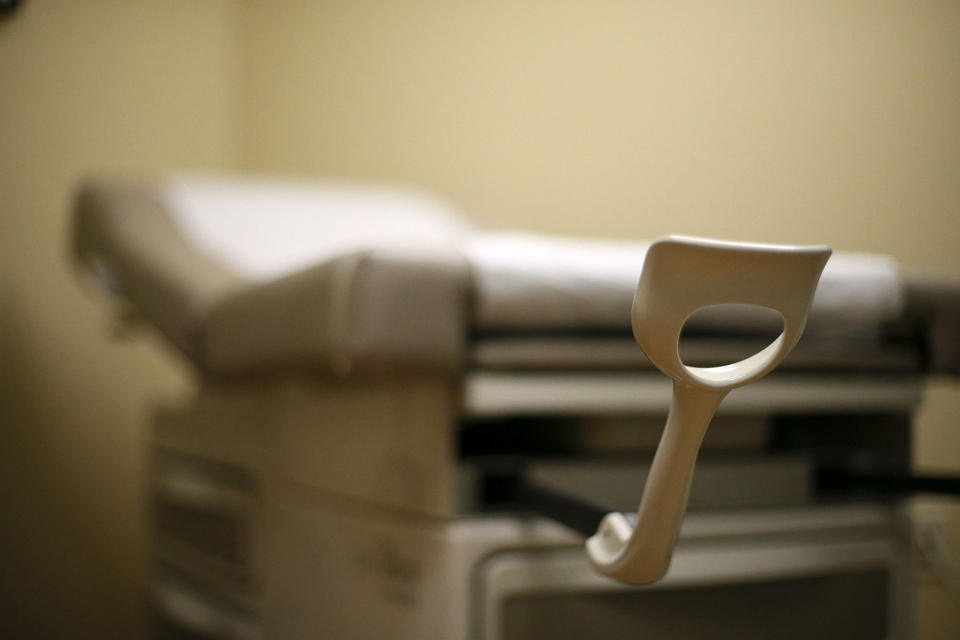With Roe overturned, Illinois — a Midwest refuge for abortion care — prepares for influx of patients from other states
CHICAGO — Illinois’ role as a haven of abortion care in the Midwest was magnified Friday, when the U.S. Supreme Court overturned Roe v. Wade, a watershed decision that reverses nearly a half-century of federally protected reproductive freedoms.
Roe was struck down when Supreme Court voted 6-3 on Dobbs v. Jackson Women’s Health Organization, upholding the legality of a 2018 Mississippi law that banned abortion past 15 weeks gestation. A leaked draft opinion last month indicated a majority of justices were planning to overturn federal abortion rights.
In the absence of Roe, the 1973 landmark case that guaranteed the right to terminate a pregnancy, the matter of abortion law falls to the states. Terminating a pregnancy is expected to be banned or significantly curtail in roughly half of all states in the nation — including nearly every state in the Midwest.
Yet Illinois remains an oasis for those seeking the procedure, as abortion providers in many surrounding states prepare to shut down. Gov. J.B. Pritzker in 2019 signed the Reproductive Health Act, ensconcing the “fundamental right” to terminate a pregnancy in state law.
Abortion providers across Illinois have been preparing for the massive influx in patients that are expected to travel here for the procedure. Planned Parenthood of Illinois anticipates an additional 20,000 to 30,000 patients will be crossing state lines for abortion care here each year.
This is on top of the increasing number of patients who have already been traveling here to terminate a pregnancy in recent years, as nearby states enacted more restrictions on the procedure, including gestational limits, mandatory waiting periods and strict regulations on providers and clinics.
Nearly 10,000 patients crossed state lines to have an abortion in Illinois in 2020, the most recent Illinois Department of Public Health data available. This was a 29% increase compared to the number of patients who traveled 2019; the number of out-of-state patients coming to Illinois to terminate a pregnancy has risen every year since 2014, according to state health department data.
Clinics in nearby states have been grappling with the end of federal abortion rights, scrambling to determine how patients can still get abortion care.
In Wisconsin, Dr. Kristin Lyerly works at a Planned Parenthood clinic in Sheboygan, about 150 miles from Chicago, which suspended scheduling abortions after Saturday, in anticipation of the Supreme Court ruling.
“We are devastated,” said Lyerly, an obstetrician-gynecologist who has performed abortions there for six months and elsewhere in the state for about a decade. “So many of the patients we see are already at a huge disadvantage, whether that means financial, support, everything. And now they will have to travel and spend more. They just don’t have the resources to get the care that they need and deserve. I’m afraid they will do unsafe things out of desperation.”
The state to the north has an 1849 law that criminalizes abortions in most cases, but was unenforceable since 1973, when Roe was established.
She believes the majority of patients in Wisconsin will travel to Illinois, some to Minneapolis.
Even before the demise of Roe, Wisconsin mandated a 24-hour waiting period to have abortion, requiring two separate appointments, one for counseling and the other to terminate the pregnancy.
“Over the last 10 years we have lost so much access,” she said. “But this is just a terrible final straw. Because abortion is health care. In greater society we see it as a political issue and its very polarizing. But within the scope of health care, this is just one of many challenging gray areas we deal with every day.”
Wisconsin Right to Life expressed support for the 1894 measure earlier this month.
“While we are facing so much heartbreaking violence in the world, we must not allow further violence in the womb,” said Heather Weininger, the nonprofit’s executive director, in a written statement. “Wisconsin Right to Life will continue to peacefully advocate for those who cannot advocate for themselves.”
Facing the end of Roe, a Tennessee abortion provider is opening a clinic in Carbondale, roughly three hours from Memphis and Nashville. CHOICES Memphis Center for Reproductive Health said on its website that the new southern Illinois clinic will offer both surgical and medication abortions.
“By the end of the year, Tennessee lawmakers will decimate abortion access in our state,” CHOICES said in written statement. “But CHOICES has a bold plan to make sure that we can continue to provide high-quality reproductive health care in our Memphis community, take care of the 4,000 people a year who depend on us for abortion care, and expand the footprint of our innovative whole-person model of care.”
In anticipation of the fall of Roe, the Iowa Supreme Court last week reversed a previous decision that guaranteed the right to abortion under the Iowa Constitution, allowing lawmakers to ban or severely restrict the procedure. The Iowa ruling stemmed from a lawsuit filed by abortion providers fighting a 2020 measure requiring a 24-hour waiting period before a patient can get an abortion.
“We are deeply disappointed that the Iowa Supreme Court is abandoning women in spite of overwhelming support for abortion access,” said Sarah Stoesz, president and CEO of Planned Parenthood North Central States, in a written statement. “Regardless of how we each feel about abortion, the decision to have an abortion is best left to a woman and her doctor.”
At the same time, the looming threat of Roe’s demise has spurred new and innovative means of abortion access in Illinois, as well as other states with strong reproductive rights protections across the country.
Planned Parenthood of Illinois last month announced that it began offering abortion pills by mail to state residents who qualify, in some cases eliminating the need to ever leave home to terminate a pregnancy. The agency said the relatively new method of accessing a medication abortion will break down “unnecessary barriers to health care.”
Patients from other states can use this service as well, but they must travel to Illinois for a telehealth or in-person visit and then pick up the medication at an Illinois clinic, according to the Planned Parenthood affiliate.
New abortion clinics also recently opened near state boundary lines, in anticipation of the end of Roe. Planned Parenthood opened a clinic opened in Waukegan near Wisconsin in 2020 and a clinic in Flossmoor near the Indiana border in 2018. Another clinic opened near the Missouri border in Fairview Heights in 2019, part of Planned Parenthood of the St. Louis Region and Southwest Missouri.
In January, two southern Illinois abortion providers established the Regional Logistics Center, a designated spot where traveling patients can get help booking lodging, finding transportation, accessing child care and get assistance funding the procedure through a variety of existing abortion funds. The center is housed in the Planned Parenthood clinic in Fairview Heights, strategically located to serve patients from other states in the Midwest and South, where abortion will be severely limited or illegal.
———



